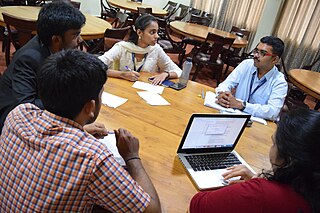Related Research Articles
Project management is the process of supervising the work of a team to achieve all project goals within the given constraints. This information is usually described in project documentation, created at the beginning of the development process. The primary constraints are scope, time, and budget. The secondary challenge is to optimize the allocation of necessary inputs and apply them to meet pre-defined objectives.

A focus group is a group interview involving a small number of demographically predefined participants. Their reactions to specific researcher/evaluator-posed questions are studied. Focus groups are used in market research to better understand people's reactions to products or services or participants' perceptions of shared experiences. The discussions can be guided or open. In market research, focus groups can explore a group's response to a new product or service. As a program evaluation tool, they can elicit lessons learned and recommendations for performance improvement. The idea is for the researcher to understand participants' reactions. If group members are representative of a larger population, those reactions may be expected to reflect the views of that larger population. Thus, focus groups constitute a research or evaluation method that researchers organize to collect qualitative data through interactive and directed discussions.
The Delphi method or Delphi technique is a structured communication technique or method, originally developed as a systematic, interactive forecasting method that relies on a panel of experts. Delphi has been widely used for business forecasting and has certain advantages over another structured forecasting approach, prediction markets.

Leonard Nelson, sometimes spelt Leonhard, was a German mathematician, critical philosopher, and socialist. He was part of the neo-Friesian school of neo-Kantianism and a friend of the mathematician David Hilbert. He devised the Grelling–Nelson paradox in 1908 and the related idea of autological words with Kurt Grelling.
Engineering management is the application of engineering methods, tools, and techniques to business management systems. Engineering management is a career that brings together the technological problem-solving ability of engineering and the organizational, administrative, legal and planning abilities of management in order to oversee the operational performance of complex engineering-driven enterprises.
Scenario planning, scenario thinking, scenario analysis, scenario prediction and the scenario method all describe a strategic planning method that some organizations use to make flexible long-term plans. It is in large part an adaptation and generalization of classic methods used by military intelligence.

Wilhelm Dilthey was a German historian, psychologist, sociologist, and hermeneutic philosopher, who held Georg Wilhelm Friedrich Hegel's Chair in Philosophy at the University of Berlin. As a polymathic philosopher, working in a modern research university, Dilthey's research interests revolved around questions of scientific methodology, historical evidence and history's status as a science.

In its most common sense, methodology is the study of research methods. However, the term can also refer to the methods themselves or to the philosophical discussion of associated background assumptions. A method is a structured procedure for bringing about a certain goal, like acquiring knowledge or verifying knowledge claims. This normally involves various steps, like choosing a sample, collecting data from this sample, and interpreting the data. The study of methods concerns a detailed description and analysis of these processes. It includes evaluative aspects by comparing different methods. This way, it is assessed what advantages and disadvantages they have and for what research goals they may be used. These descriptions and evaluations depend on philosophical background assumptions. Examples are how to conceptualize the studied phenomena and what constitutes evidence for or against them. When understood in the widest sense, methodology also includes the discussion of these more abstract issues.

Business process modeling (BPM), mainly used in business process management; software development, or systems engineering, is the action of capturing and representing processes of an enterprise, so that the current business processes may be analyzed, applied securely and consistently, improved, and automated. BPM is typically orchestrated by business analysts, leveraging their expertise in modeling practices. Subject matter experts, equipped with specialized knowledge of the processes being modeled, often collaborate within these teams. Alternatively, process models can be directly derived from digital traces within IT systems, such as event logs, utilizing process mining tools.

Business process re-engineering (BPR) is a business management strategy originally pioneered in the early 1990s, focusing on the analysis and design of workflows and business processes within an organization. BPR aims to help organizations fundamentally rethink how they do their work in order to improve customer service, cut operational costs, and become world-class competitors.

Design management is a field of inquiry that uses design, strategy, project management and supply chain techniques to control a creative process, support a culture of creativity, and build a structure and organization for design. The objective of design management is to develop and maintain an efficient business environment in which an organization can achieve its strategic and mission goals through design. Design management is a comprehensive activity at all levels of business, from the discovery phase to the execution phase. "Simply put, design management is the business side of design. Design management encompasses the ongoing processes, business decisions, and strategies that enable innovation and create effectively-designed products, services, communications, environments, and brands that enhance our quality of life and provide organizational success." The discipline of design management overlaps with marketing management, operations management, and strategic management.
Competence is the set of demonstrable characteristics and skills that enable and improve the efficiency or performance of a job. Competency is a series of knowledge, abilities, skills, experiences and behaviors, which leads to effective performance in an individual's activities. Competency is measurable and can be developed through training.
Systemic therapy is a type of psychotherapy that seeks to address people in relationships, dealing with the interactions of groups and their interactional patterns and dynamics.
ion is a term originally used to describe a software development process pioneered and deployed during the mid-1970s by the New York Telephone Company's Systems Development Center under the direction of Dan Gielan. Following a series of implementations of this methodology, Gielan lectured extensively in various forums on the methodology and its practices. Arnie Lind, then a Senior Systems Engineer at IBM Canada in Regina, Saskatchewan created and named joint application design in 1974. Existing methods, however, entailed application developers spending months learning the specifics of a particular department or job function, and then developing an application for the function or department. In addition to development backlog delays, this process resulted in applications taking years to develop, and often not being fully accepted by the application users.

In software engineering, structured analysis (SA) and structured design (SD) are methods for analyzing business requirements and developing specifications for converting practices into computer programs, hardware configurations, and related manual procedures.
In organizational development, corporate diagnostics provides tools for the effective diagnosis of organizational culture, and structural and operational strengths and weaknesses.
Gottfried Fischer was a German psychologist, psychotherapist and psychoanalyst. He is considered to be the founder of psychotraumatology in Germany and has been director of the Institute for Clinical Psychology and Psychological Diagnostics at the University of Cologne from 1995 to 2009.
In software engineering, a software development process or software development life cycle is a process of planning and managing software development. It typically involves dividing software development work into smaller, parallel, or sequential steps or sub-processes to improve design and/or product management. The methodology may include the pre-definition of specific deliverables and artifacts that are created and completed by a project team to develop or maintain an application.

The Fraunhofer Institute for Open Communication Systems, or FOKUS, is an organization of the Fraunhofer Society. Headquartered in Berlin (Charlottenburg), the institute is engaged in applied research and development in the field of Information and Communications Technology. The institute is jointly led by Prof. Manfred Hauswirth and Dr. Tom Ritter. Manfred Hauswirth also holds a chair at the Technische Universität Berlin. Dr. Tom Ritter is the institute's deputy director.
Rainer Mausfeld is a retired German professor of psychology at Kiel University. He did research on the psychology of perception, cognitive science, and the history of psychology. Since 2015, he has published on manipulation in media and politics and the transformation of representative democracy to neoliberal elite democracy.
References
- ↑ "Consulting".
- ↑ "CIPAST - The Metaplan Methodology".
- ↑ "What is METAPLAN? definition of METAPLAN (Black's Law Dictionary)". 19 October 2012.
- ↑ Chenot, Jean-François; Scherer, Martin; Becker, Annette; Donner-Banzhoff, Norbert; Baum, Erika; Leonhardt, Corinna; Keller, Stefan; Pfingsten, Michael; Hildebrandt, Jan; Basler, Heinz-Dieter; Kochen, Michael (2008). "Acceptance and perceived barriers of implementing a guideline for managing low back in general practice". Implement Sci. 3 (7): 7. doi: 10.1186/1748-5908-3-7 . PMC 2275295 . PMID 18257923.
- ↑ Anderson, Gina; Dunlap, Karen; Rademacher, Joyce; McMenamy, Nancy (2009). "Metaplan: A Mutual Methodology for Interdisciplinary Research". SoTL Commons Conference. 104.
- ↑ "Metaplan - Academy". www.metaplan.com.
- ↑ Eberhard Schnelle (Hrsg.) (1978). "Neue Wege der Kommunikation. Spielregeln, Arbeitstechniken und Anwendungsfälle der Metaplan-Methode". Veröffentlichungen der Stiftung Gesellschaft und Unternehmen (in German). Heft 10. Königstein/Ts.: Peter Hanstein Verlag.